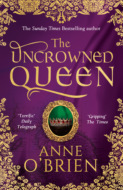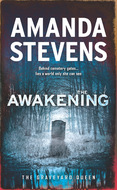Raamatut ei saa failina alla laadida, kuid seda saab lugeda meie rakenduses või veebis.
Loe raamatut: «Miranda»
WHO WAS SHE?
In Regency London, a woman escapes from a burning warehouse only to realize she doesn’t know her own identity. Although the locket around her neck bears the name Miranda, she has no recollection of her past. Nor does she know why two very different men want her—the devilishly handsome Scotsman Ian MacVane, and Lord Lucas Chesney, the nobleman who claims to be her betrothed.
In a race against time to discover who she is and which man she can trust, Miranda embarks on a soul-stirring journey that takes her from the dazzling salons of London to the craggy Highlands of Scotland. All of her beliefs—about herself, her world and the nature of love—are tested to their limits as she seeks the truth about her past and finds an unexpected passion that ignites the hidden fires within….
Praise for #1 New York Times bestselling author Susan Wiggs
“Wiggs’s storytelling is heartwarming…clutter free…[for] romance and women’s fiction readers of any age.”
—Publishers Weekly
“Susan Wiggs writes with bright assurance, humor and compassion.”
—Luanne Rice
“Wiggs’s talent is reflected in her thoroughly believable characters as well as the way she recognizes the importance of family by blood or other ties.”
—Library Journal
“Susan Wiggs paints the details of human relationships with the finesse of a master.”
—Jodi Picoult
Miranda
Susan Wiggs
Contents
Cover
Back Cover Text
Praise
Title Page
Prologue
One
Two
Three
Four
Five
Six
Seven
Eight
Nine
Ten
Eleven
Twelve
Thirteen
Fourteen
Fifteen
Sixteen
Seventeen
Eighteen
Nineteen
Twenty
Epilogue
Extract
Copyright
Prologue

London
June 1814
The writing paper held the scent of violets, and that was the first clue.
The difficult cipher, based on a momentous day in the life of Napoleon Bonaparte, became clear after study. The key was not his birthday, after all, but an event far more significant: the date the defeated emperor went into exile on the Isle of Elba—4 May 1814. And that was the second clue.
The Allies believed the wars were finally over. At last a Bourbon king again sat upon the throne of France. Bonaparte would never return to seize power.
But the sender of the message disagreed.
M——
The hour of glory approaches. The crowned despots of Europe and their butchering battle commanders will all arrive in England before the end of summer.
They believe they have come to celebrate a lasting peace. Only you and I know their true destiny.
The final solution lies within our grasp, thanks to Miranda Stonecypher. Once we learn her secret, she must die. Else half the men of England will be after Miranda.
La Couleuvre
The hand holding the message clenched into a fist, crumpled the perfumed paper and hurled it into the hearth fire.
One

How weak and powerless I am in this
whirlwind of plotting and treachery.
—Empress Marie-Louise,
second wife of Napoleon Bonaparte
London
June 1814
In the beginning, there was a single point of light. It narrowed to the tiniest tip of a needle, piercing in its intensity, cold and white as the brightest star. She went toward it, a dreamer compelled by a quest of the soul. Closer, closer she drew, the light her only guide along the inexorable journey. Closer, closer. She was almost there; soon she would be able to reach forward, to tumble into the light...
The pinprick grew and exploded into searing, shattering pain. A cry started in her chest and rose through her, emerging ragged and desperate from her mouth.
A fog of noxious sulfur corrupted the air. She could see the yellow-tinged cloud in the deadly flashes erupting all around her. The menacing whine of flying rockets screamed in her ears. A bomb soared and careened against the roof beams of the warehouse.
She stood amid hellfire and brimstone, confused yet feeling oddly unafraid. She had bruises on her body, and her wrists were burned by the rope that had bound her. Perhaps knowing she was doomed, knowing the matter of her own death was now out of her hands, banished the fear. Gripped by a peculiar, numb tranquillity, she watched a wooden crate catch fire.
Eerily beautiful flames flared with a dreamlike slowness, licking along the edges of the crate and then climbing to the boxes stacked above it.
A single word was stamped on the face of each box: Explosives.
Even as a sense of peril registered, she knew with a strange feeling of detachment that it was too late to run. A second later, the crates and boxes exploded, bursting outward from a force within.
She felt pain, but from a distance. The force of the explosion hurled her backward. She waited for the impact of the wall, something to stop her, but the wall had disappeared. Just for a moment she was flying, flying into the black night.
She landed against a mound of baled cotton piled in an alleyway adjacent to the warehouse. The breath left her in a whoosh. She lay still, with the pain dancing madly, like a dervish, in her head.
The fireworks soared, turning night to day, angry lightning bolts in the sky. She began to realize, with dawning wonder, that she had done the impossible. She had survived. Perhaps, after all, she might live.
If she wished to.
Then a new flash cleaved the night. A plume of fire and smoke erupted in the alley. She could feel the roar of heat in her face. The flames reached for her, golden talons stretching closer, touching off the bales, sealing off her escape route. She tasted death again, its nearness, its allure whispered in her with a breath of fire.
Still unafraid, she started to surrender. Some part of her rejoiced. It was over. At last, all over. No one had won. All was lost.
A ball of fire rolled toward her, hungry, angry. Trapped in the alley, she slid deeper and deeper into submission, welcoming the end. But some tenacious hesitancy niggled at her, some sense that she was not ready yet. Someone needed her.
She staggered to her feet, swaying, the brick wall too hot to touch. Unfinished business. Benignly she noted that the bodice of her dress had been torn and then hastily repaired with a curved dressmaker’s pin.
Unfinished business. Her mind groped for the nature of that business, but smoke filled her lungs, and thoughts skittered away.
Concentrate, she told herself, closing her eyes. And she began to open up, to let in the unthinkable, and it almost surfaced. Then her awakening sense of reason snapped shut like a closing mantrap.
“Lass!” a voice called. It sounded faint, but she realized it was because the explosions had deafened her. “Give me your hand!” the stranger yelled.
She opened her eyes. Turned toward the deep, urgent voice. Through a veil of fire she saw him, tall and broad, a fluid, racing shadow backlit by shooting stars.
“Lass,” he shouted again, “you’ve got to come away from there now, while there’s still time.”
She couldn’t move, couldn’t speak, could only stare as the blaze rose higher around him. He was wonderful, an archangel of shadow and light, bursting through the curtain of flame. Gloved hands snatched her up as if she were a poppet doll.
She tucked her face into the shelter of a huge shoulder. The frock coat reeked of sulfur and smoke and sweat. She felt the jarring thud of his footsteps as he ducked his head and spirited her away from the exploding building.
Shouts and whistles echoed through the streets. A brigade was already strung along down to the wharf, passing buckets frantically from the river.
He set her on her feet in the recessed doorway of a brick building, gripped her shoulders and leaned down to peer into her face. “What in God’s name were you doing there? Are you all right?”
Dust and ash clogged her throat and mouth. Her vision was blurred by cinders and tears. She could not see his features, could make out only the shape of her savior against the roaring light of the fire behind him.
“Lass!” He gave her a gentle shake.
She managed to nod, to croak, “I am not badly hurt.”
The shadow man swung off his frock coat, draped it around her shoulders. She had a swift impression of a broad chest, powerful arms. Safe. She would feel safe in those arms. She desperately needed to feel safe.
“Aye, then,” he said. “Take care you don’t—”
“Help! Help me!” The cry pierced through the bellow of flames and the crash of falling timbers. High in a tenement across the way stood a boy, just a little child, waving from a window. The roof above him had caught fire. So had the stairwell below him.
Her rescuer uttered a foreign word; it sounded like a curse. Before he even spoke or moved, she knew he would leave, and she felt an inexplicable sense of grief and yearning.
Stay with me, she wanted to plead. She longed to draw him into the light, to look at his face, to know the man who had snatched her from death.
Yet she felt no surprise when he shoved her toward a red-faced man overseeing the brigade. “Are you the watchman?” her savior asked.
“Aye, on patrol I was, and found myself in hell.”
“Look after this one,” he said, indicating her with a nod of his dark head. “I’ll go for the lad.”
“Christ, you’ll die trying,” the watchman said. “There’s no way to get to the child.”
But the man was gone, rushing toward the flames, disappearing into the burning building. The watchman pulled her to the end of the alley, where people were starting to gather.
A kaleidoscope of horrors wheeled around her. She saw the walking wounded, people with blackened burns and bleeding cuts, their faces lacerated by flying debris. Shredded paper made a snowstorm of confetti that flurried through the night sky. A woman ran past, cradling a child in her arms. A man walked by, his face as blank as a sleepwalker’s. From the front, he appeared unscathed, his starched shirt and cravat perfectly white. Then, making no sound, he pitched forward and landed facedown at her feet. In the back, his clothes had been burned and shredded away. Smoke rose from his blistered flesh.
She bent to help him, scooping water from a bucket onto his skin. He screamed and shuddered, choked out a prayer, fell silent. She gestured frantically to two men who were bearing off the wounded on litters made of bedsheets and rough blankets. While they moved the victim onto the litter, she chanced a look at the tenement. The stranger who had helped her was now climbing the burning stairs toward the child. For a big man, he moved swiftly, gracefully, as if accustomed to performing with great competence during a disaster. He snatched up the boy. For a fraction of a second, he simply stood and clasped the child to his chest, holding the small form as if it were infinitely precious. An orange glow formed a halo around them so that they were beautiful together, bejeweled in flickering light.
Ah, she knew what the child must be feeling. Those all-powerful arms enveloping her, bearing her to safety.
She had just decided that he was an angel when the stairs collapsed. She half expected him to sprout wings and fly. A whimsical notion, a fleeting hope. Both the man and the child plummeted into a pit of burning timber. Sparks gushed upward from the broken skeleton of the building.
Choking with sobs that tasted of sulfur and soot, she tried to go to them. A wall of flame obscured them from view.
Someone grabbed her roughly, drew her back. “Too late,” the watchman said. “You’re needed here.”
She heard someone else shout, “Miss, over here! Help us with this one!”
She struggled with the watchman, but he held her fast, shoving her to her knees beside a man with something metal embedded in his leg. “Concern yourself with the living, for chrissakes,” the watchman ordered.
The eyes of the wounded man pleaded with her. She had no choice but to stay with him.
Moving like a dreamwalker, she survived the night, helping, grieving, casting glances down the alleyway and hoping against hope that the tall man would come out, unscathed, with the little boy in his arms.
She had no sense of the passing of time, but rain began to fall as dawn tinged the sky. People raised grateful, smoke-blackened faces, welcoming the rain, letting it deal a final death blow to the fire they had battled all night.
The watchman found her as she was offering sips of water to a shaken old man. She looked at the blackened remains of the tenement. He shook his head. “There were no other survivors, miss. I tried to stop him, but...” He lifted his shoulders in a helpless shrug. “You’d best be finding your way home.”
Home. She mouthed the word. No sound came out.
“Your family’ll be asking after you.”
She stared at the harsh, weary face, the small, speculating eyes. Despair trickled through her, drizzling like the rain.
“Miss?” He cocked his head. His singed brows drew together. “Shall I send for someone?”
She felt a great well of emptiness open up within her. Heard a silent scream inside her soul. And finally forced herself to face the truth she had avoided all night.
She had no memory, no notion at all of who she was, no knowledge of what she had been doing in the warehouse.
Or why someone would want her dead.
The thought chilled her, but she knew she was the reason for the disaster, knew it just as certainly as if the devil himself had whispered it in her ear.
She gave a strangled cry and put her hand to her dry, raw throat. Her fingers encountered a metal object there, something round, suspended from a thin chain.
A silver locket. She pulled it from her bodice and squinted at it through smarting eyes. Something was engraved on the locket. A word. Someone’s name. Her name.
Miranda.
* * *
Ian MacVane stared out the window of his fashionable Hanover Square house, watching a piece of torn silk blowing on the breeze and feeling a cold sense of doom.
“You didna tell me there was a girl involved,” he said in a low, furious voice. Its tone was even deeper than usual because of the smoke and fumes he had inhaled from the warehouse explosion.
His visitor followed his gaze to the window. Heavy velvet draperies framed a view of elm and cherry trees, elegantly understated wrought-iron fences in front of handsome houses. A blue-eyed stare sharpened on the bit of blowing silk.
“What do you suppose that is, flying about like an infernal kite? A piece of someone’s parade flag or aerial balloon, no doubt. London is simply crawling with dignitaries this summer. One can hardly take a chaise down Regent Street without stumbling upon a Prussian prince or a grand duke or some war hero draped with decorations.”
The speaker turned to face Ian where he lounged on the bed, naked from the waist up. “These are interesting times we live in, darling, are they not?”
Ian glared at Lady Frances Higgenbottom. “The girl,” he repeated. “You didna tell me the traitor was a girl.”
Lady Frances sighed. She took out her silk fan and idly waved it in front of her round, beautiful face. “If I had mentioned a girl, you might have gone and had a fit of scruples and possibly refused to help us. We are charged with safeguarding all the crowned heads of Europe while they’re in London. That duty must come first.”
Ian shifted on the satin sheets, wincing as the fabric brushed his burned shoulder and back. He told himself to be grateful to be alive at all. God knows he had wished for death in that moment when he’d looked down, realized that he had climbed to such a great height to fetch the child.
More than death, more than heated battle, even more than the past locked up tight in his heart, Ian MacVane feared heights.
The fall should have killed him, but somehow both he and the lad had managed to survive. He remembered being dragged to safety on a length of sailcloth. Gingerly he lowered the sheet farther so the fabric wouldn’t chafe him.
Lady Frances fell so still that her golden ringlets stopped bobbing. “Good Lord, MacVane. Must you be so damnably alluring? The fate of Europe is at stake, and all I can think of is your body.”
“You don’t even like me, Frances.”
“Whatever gave you that idea?”
A wry smile curved his mouth. “I think it was the time you made me fight a duel with an unloaded pistol, or perhaps your sending me by unarmed tender to deliver a message during a naval battle. I began to suspect—” Ian stopped himself, for she had done it again. Twisted the conversation away from the point he was trying to make. It was one of her many talents, and one that made her so effective in her secret role as chief spymaster of the Foreign Office.
“The lass,” he said grimly. “I’m still waiting for an answer.”
Frances snapped her fan shut and slapped it against the palm of her gloved hand. “You would have balked. Or gotten—heaven forbid—passionately entangled.”
He narrowed his eyes at her, giving her the full force of an icy glare. “When have I ever gotten passionately entangled?”
She rubbed her hands up and down her arms as if the room had grown chilly. “God, MacVane. You’re as cold as a Highland winter. I’ve always wondered why.”
There was a reason, but Frances was the last person he would tell. She knew far too much already.
She went to a cherrywood butler’s table and poured sherry from a crystal decanter. Ian studied each dainty, deceptive movement. Her costume was a confection of pink silk and frills, with little pink topboots showing beneath the scalloped hem of her skirt. To anyone but the most astute observer, she was an empty-headed miss with no more on her mind than a plumed cap. The one concession to her true vocation was a tiny black lily stamped on the heel of her left boot.
She tasted the sherry and regarded Ian with a half smile. “We had been watching Miranda Stonecypher for some time—along with her father, Gideon. She is presumed to know very little.” Frances’s sweet, kiss-me-you-fool mouth twisted into an ironic smile. “Even less now.”
“Bitch.” Ian blew out a sigh and flung his forearm over his brow, scowling out the window again. The scrap of silk had caught in the branch of an elm tree, fluttering red and royal blue on the summer breeze.
He squeezed his eyes shut, trying not to see the wounded with their bleeding faces and wide, wondering eyes, the eyes of innocents caught in the maelstrom of the explosion, eyes that asked the one unanswerable question: Why?
Ian himself had wondered that, all those years ago, back when he had been innocent, when he had been a victim.
“Everyone who is anyone is coming to London this summer,” Frances continued, ignoring his insult. “There will be an assassination attempt, an elaborate one. So far, that is all we know. Our task is to find out the rest, and then keep it from happening.”
“Go on,” he said through gritted teeth.
“There’s nothing more to report.” She took a dainty sip of sherry. “Traitors are a dangerous lot, MacVane. They often turn upon their own.” She paused dramatically. He caught her meaning.
“So it wasna you nor any of your agents who set off the explosion?”
Her nostrils flared. “I’ll pretend you never asked me that, MacVane. Innocent people could have died last night, damn your eyes. As it happened, the only casualty was the traitor.”
“You just said the woman knew very little,” Ian pointed out.
She glanced at herself in the mirror over the washstand and primped. “As we know, looks can be deceiving.” She cleared her throat. “The demise of a woman is a regrettable thing. But in this case, it is serendipitous and will—at least for a time—disrupt the plans of Bonaparte’s conspirators.”
Ian thought for a long time. His bed was unspeakably comfortable, his home luxurious and a delicious luncheon was set out on a tray. No one would blame him for spending the day in idleness, nursing his wounds and resting.
Damn. The notion tempted him.
And so it was all the more excruciating for him to brace his arms on the mattress and lever himself up. He swung his legs to the floor.
Lady Frances squealed and clapped her hands over her eyes. “MacVane! My virtue!”
He had to laugh at that. “Virtue is surely the least of your worries, Fanny. Don’t fret, I won’t tell your precious Lucas you were here.”
“He is not my Lucas,” she retorted. “Yet.”
He stuffed his legs into buckskin breeches and swore with the pain as he drew on his freshly polished Hessians.
She peeked through her splayed fingers. A tiny gasp slipped from her.
“You’re cheating, love,” he said with a wink, but he couldn’t resist flexing his chest muscles.
Her fingers snapped shut. “You’re insolent. And what the devil do you think you’re doing?”
He swore louder now, in English and Gaelic both. “Putting on my shirt. Which is not a comfortable operation given the condition of my shoulder.”
“You shouldn’t have gone into that tenement, MacVane. But I’m not surprised you’d insist on playing the hero.”
“Saving a child from certain death is not heroic,” he told her. “Merely human.”
“Then you should have let some other human risk it. I need you. Whatever became of the child, anyway?”
A loud crash sounded from somewhere belowstairs, followed by the patter of running feet and a childish giggle. Ian bit back a grin. “Does that answer your question, my lady?”
“God, MacVane! We’ve got enough troubles without becoming an orphan asylum.”
“Then adopt the little mite, and he’ll be an orphan no more. You’d make such a charming maman.”
She borrowed one of his choice oaths, and the word sounded incongruous coming out of her cupid’s-bow mouth. Then she said, “Are you decent yet?”
He let out a bark of a laugh. “Fanny, my dear, I have never been decent. That’s what you like about me.”
She dropped her hands to plant them on her dainty waist. “So?”
“She didna die, Fanny.”
Her sweet red mouth formed an O. “What?”
“The girl. She survived the explosion. I had no idea she was the one or I would not have misplaced her.”
“But that’s imposs—”
“How would you know?” he snapped. “Unless you ordered her killed.” He watched her closely. “Och, I didna mean that, Fanny. For all that you are, you’ve never resorted to murder.”
“Yet,” she reminded him, fixing him with a lethal glare. “So where are you going?”
“I’m surprised you haven’t guessed yet.” He selected a waistcoat from the clothes press. It was made of tweedy Lowlander stuff, but he had no time to be selective. He donned the waistcoat and said, “I’m going after Miranda.”









